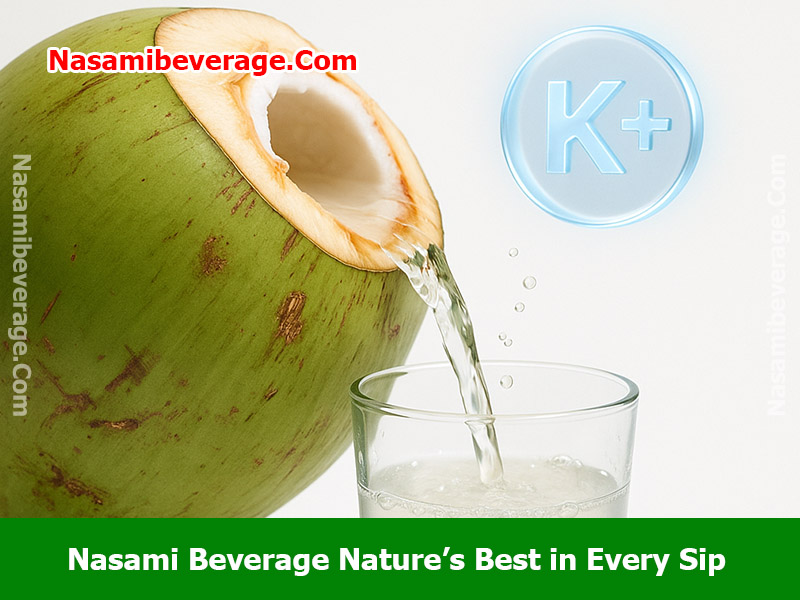Coconut water has surged in popularity as a natural hydration drink, but does coconut water have potassium? This article explores the potassium content of coconut water, its health benefits, and how it compares to other beverages. From understanding its nutritional profile to choosing the best brands, you’ll discover why coconut water is a go-to for health-conscious individuals. Let’s dive into the facts and uncover the science behind this tropical elixir.
The potassium content in coconut water
Coconut water is celebrated for its refreshing taste and nutrient-packed profile, with potassium leading the charge. This section breaks down exactly how much potassium coconut water contains and highlights other key nutrients that make it a wellness favorite.
How much potassium is in coconut water?
A single cup of coconut water delivers approximately 600 milligrams of potassium, making it a standout source of this essential mineral. For context, a medium banana provides around 420 milligrams, while a baked potato offers about 910 milligrams.
This positions coconut water as a convenient and tasty way to boost your potassium intake, especially for those on the go. Whether you’re rehydrating after a workout or simply seeking a nutrient-rich drink, coconut water’s potassium content supports muscle function and overall wellness.
Other nutrients in coconut water
Beyond potassium, coconut water boasts a range of electrolytes like magnesium and calcium, which aid in hydration. It also contains small amounts of vitamins, such as vitamin C, and minimal dietary fiber, which supports digestion.

Unlike many bottled beverages, pure coconut water is naturally low in sugar, though some packaged versions may include added sweeteners.
Opting for unsweetened varieties ensures you maximize the nutritional benefits without unnecessary calories. Curious about how many calories in coconut water? It’s typically low, making it a guilt-free choice.
Why potassium matters for your health
Potassium is a powerhouse mineral that plays a critical role in your body’s daily functions. From supporting hydration to promoting heart health, the potassium in coconut water offers benefits that appeal to fitness enthusiasts and wellness seekers alike.
Supports hydration and muscle function
Potassium is essential for maintaining proper hydration and muscle health. It helps regulate fluid balance, ensuring your body stays hydrated during exercise or hot weather.
For athletes, potassium reduces the risk of muscle cramps by supporting nerve signaling and muscle contractions. Drinking coconut water post-workout replenishes lost electrolytes, making it a smart choice for recovery.

Its natural composition makes it a cleaner alternative to sugary sports drinks, delivering hydration without artificial additives. Learn more about whether coconut water helps with hydration.
Boosts heart health
Potassium also supports cardiovascular health by helping regulate blood pressure. It counteracts sodium’s effects, relaxing blood vessel walls and improving circulation.
Regular consumption of potassium-rich foods, like coconut water, may lower the risk of hypertension and support long-term heart health. Incorporating coconut water into your diet provides a refreshing way to nurture your heart while enjoying a tropical flavor.
Is coconut water the best potassium source?
With so many potassium-rich options available, how does coconut water stack up? This section compares coconut water to other beverages and foods to help you decide if it’s the right choice for your nutritional needs.
Coconut water vs. sports drinks
Sports drinks are often marketed as hydration solutions, but they frequently contain high levels of sugar and artificial ingredients. Coconut water, by contrast, offers a natural blend of electrolytes, including potassium, with minimal processing.
While sports drinks may provide quick energy for intense workouts, coconut water delivers comparable hydration benefits without the synthetic additives.

For everyday hydration or light exercise, coconut water is a healthier, more natural option. Wondering if coconut water is good for athletes? It’s a top choice for natural recovery.
Coconut water vs. bananas and other foods
When compared to foods like bananas or potatoes, coconut water holds its own as a potassium source. A cup of coconut water provides more potassium than a banana, though less than a potato.
However, coconut water’s liquid form makes it easier to consume on the move, offering a refreshing alternative to solid foods. Its versatility and mild flavor also make it a popular choice for smoothies or as a standalone drink, unlike denser potassium-rich foods.
How to pick the best coconut water
Not all coconut water is created equal. To ensure you’re getting the most potassium and nutritional value, consider these factors when selecting a product.
What to look for in coconut water brands
Top brands like Vita Coco, Zico, and Harmless Harvest prioritize quality, offering pure coconut water without added sugars or artificial flavors. Check labels for organic certifications or minimal ingredients to ensure purity.
Some brands, like C2O and Taste Nirvana, offer unique flavors, but these may include sweeteners that dilute nutritional benefits. Choosing a reputable brand guarantees you’re getting authentic coconut water with maximum potassium and electrolyte content.
Interested in what Harmless coconut water is all about? It’s a premium, organic option.
Fresh vs. packaged coconut water
Fresh coconut water, straight from a young green coconut, is the gold standard for flavor and nutrition. It contains slightly higher levels of potassium and fewer preservatives than packaged versions.
However, packaged coconut water is more accessible and has a longer shelf life, making it practical for daily use. If opting for packaged, select products with no added sugars or flavors to maintain the drink’s natural benefits.
Both options are potassium-rich, but fresh coconut water offers a purer experience when available. Be sure to check how to know if coconut water is bad to ensure freshness.
Frequently asked questions about coconut water and potassium
How much potassium does coconut water contain compared to a banana?
A cup of coconut water contains about 600 milligrams of potassium, while a medium banana has around 420 milligrams. Coconut water edges out bananas, making it a potent liquid source of the mineral.
Is coconut water a good source of electrolytes for athletes?
Yes, coconut water is an excellent electrolyte source, providing potassium, magnesium, and calcium. It’s ideal for athletes seeking natural hydration and recovery support after workouts.
Can drinking coconut water help with muscle cramps?
Potassium in coconut water helps regulate muscle contractions and nerve signals, potentially reducing cramps caused by dehydration or electrolyte imbalances. Regular consumption may improve muscle health.
Are there any risks to drinking too much coconut water?
While coconut water is generally safe, excessive consumption may lead to high potassium levels, particularly for those with kidney issues. Moderation is key, especially with sweetened varieties high in sugar.
Coconut water is a potassium-packed, natural hydration solution that supports muscle function, heart health, and overall wellness. Its electrolyte-rich profile makes it a standout choice for fitness enthusiasts and anyone seeking a refreshing, nutrient-dense beverage.
Compared to sports drinks or other potassium sources, coconut water offers a clean, flavorful alternative with minimal processing. As Hippocrates wisely said, Let food be thy medicine and medicine be thy food.
Embrace coconut water as a delicious way to nourish your body and elevate your health. Discover premium options from Nasami Beverage and make coconut water a staple in your wellness routine.


